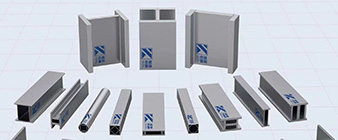Titanium Grade 2 (Ti Gr 2 / 3.7035) is widely used in structural applications due to its excellent mechanical properties and corrosion resistance. The following is an overview of its applications, especially in structural stations:
Marine Structures
– Shipbuilding: used for hulls and structural components of ships and submarines due to its light weight and resistance to seawater corrosion.
– Offshore platforms: Structural elements for oil rigs and wind turbines, where durability and strength for harsh marine environments are critical.
Aerospace Industry
– Aircraft components: Used in various structural components such as frames and brackets where weight reduction without compromising strength is crucial.
– Spacecraft Structures: Ideal for parts exposed to extreme conditions, including satellite frames and launch vehicle structures.
Chemical Processing
– Pipes and Vessels: Pressure vessels and piping systems often used to transport corrosive substances, ensuring long service life and reliability.
– Storage tanks: Storage tanks used to store corrosive chemicals with excellent corrosion resistance.
Architectural Applications
– Structural Framing: Beams and columns used in modern buildings for both aesthetic appeal and structural integrity.
– Facades and cladding: Ideal for building exteriors due to its corrosion resistance and ability to withstand environmental factors.
Nuclear Power Plant
– Structural supports: used in containment structures and support frames to ensure safety and stability in critical environments.
– Heat exchanger: used in cooling systems due to its resistance to corrosion and high temperatures.
1. Corrosion resistance: Excellent anti-oxidation and corrosion resistance, making it suitable for use in corrosive environments.
2. High strength-to-weight ratio: Significant weight reduction compared to traditional materials, thereby improving performance in a variety of applications.
3. Ductility and formability: Good ductility allows for a variety of manufacturing techniques, including bending and welding.
4. Temperature resistance: Maintains mechanical properties at high temperatures, suitable for high temperature applications.
5. Biocompatibility: Ideal for medical applications requiring compatibility with human tissue.
– Cost: Titanium is generally more expensive than traditional materials such as steel, which may limit its use in certain applications.
Titanium Grade 2 construction offers numerous advantages across industries, especially those where strength, weight and corrosion resistance are critical. As technology and manufacturing methods improve, its applications continue to expand.
If you need more specific information or examples, please feel free to ask Peak Kong Special Steel!
-
 2023-12-28 Types and applications of advanced high-strength structural steel profiles
2023-12-28 Types and applications of advanced high-strength structural steel profiles -
 2024-9-20 Laser welding fabrication process of Ti Gr 1 / 3.7025
2024-9-20 Laser welding fabrication process of Ti Gr 1 / 3.7025 -
 2024-9-14 Application of weather-resistant structural steel profiles in steel bridges
2024-9-14 Application of weather-resistant structural steel profiles in steel bridges -
 2024-9-24 High-strength H-piles UBP305*305*223kg/m/UBP305*305*283kg/m
2024-9-24 High-strength H-piles UBP305*305*223kg/m/UBP305*305*283kg/m -
 2024-9-16 2507 super duplex stainless steel Hollow Structural Sections
2024-9-16 2507 super duplex stainless steel Hollow Structural Sections -
 2024-9-21 S460 steel VS S690 steel
2024-9-21 S460 steel VS S690 steel -
 2024-1-02 I-beam production technology and application
2024-1-02 I-beam production technology and application



